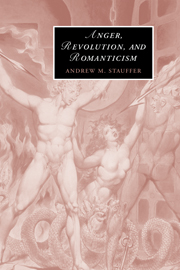Book contents
- Frontmatter
- Contents
- Acknowledgments
- List of abbreviations
- Introduction: fits of rage
- 1 Towards Romantic anger
- 2 Burke, Coleridge, and the rage for indignation
- 3 Inflammatory reactions
- 4 Provocation and the plot of anger
- 5 Shelley and the masks of anger
- 6 Byron's curse
- Epilogue
- Notes
- Bibliography
- Index
- CAMBRIDGE STUDIES IN ROMANTICISM
4 - Provocation and the plot of anger
Published online by Cambridge University Press: 22 September 2009
- Frontmatter
- Contents
- Acknowledgments
- List of abbreviations
- Introduction: fits of rage
- 1 Towards Romantic anger
- 2 Burke, Coleridge, and the rage for indignation
- 3 Inflammatory reactions
- 4 Provocation and the plot of anger
- 5 Shelley and the masks of anger
- 6 Byron's curse
- Epilogue
- Notes
- Bibliography
- Index
- CAMBRIDGE STUDIES IN ROMANTICISM
Summary
I was angry with my friend;
I told my wrath, my wrath did end
I was angry with my foe:
I told it not, my wrath did grow.
– Blake, “A Poison Tree”William Blake's “A Poison Tree” suggests that acting upon anger puts an end to plot; whether we tell or wreak our wrath, its expression is antithetical to calculated narratives. As Philip Fisher says, anger is a fundamentally rash emotion precisely at odds with the “world of plots.” On the other hand, the same poem presents the cultivation of angry passions as dependent upon the secret plotting of the speaker, whose hunger for vengeance grows in proportion to the narrative's deferral of satisfaction. In other words, in Blake's poem, anger both requires plots and disables them. This double vision is symptomatic of a broader, historically specific oscillation in British conceptions of anger during the 1790s, due primarily to the influence of the French Revolution and the ways it was discussed. In English political, medical, and legal discourse of the period, we find a remarkable alignment of changing attitudes towards rage in the wake of the Revolution, as a fear of popular anger permeated the culture. As revolutionary anger was being demonized as irrational, destructive rage in conservative political discourse, inflammation (of the body and body politic) was being reconceptualized as a dangerous disease in metaphorical and medical terms.
- Type
- Chapter
- Information
- Anger, Revolution, and Romanticism , pp. 87 - 109Publisher: Cambridge University PressPrint publication year: 2005



